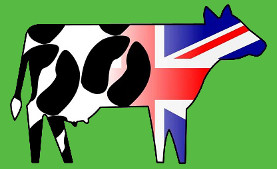By Block, E., Journal of Dairy Science, 1994
Description
Dietary cation-anion difference has been defined as milliequivalents of (Na + K) - (Cl + S) per kilogram of DM and has a direct impact on blood acid-base metabolism. As this difference decreases, one or more of the following blood parameters change: increased H+, decreased HCO3-, and decreased pH. These changes are accompanied by reduced urinary HCO3- excretion and pH as compensatory mechanisms. Although other minerals have an impact on acid-base metabolism, the four minerals used in dietary cation-anion difference have the greatest effect. Manipulation of acid-base balance can be used to manipulate other biological functions to benefit health and productivity of cows. Low cation-anion difference prepartum can mitigate hypocalcemia peripartum via increased urinary Ca, blood-ionized Ca, and responsiveness to Ca homeostatic hormones. These changes reduced the incidence of paresis and increased productivity by reducing the severity and length of hypocalcemia in all cows (periparturient), regardless of the occurrence of paresis. Reduced cation-anion differences prepartum have been related to a reduced severity of udder edema, likely related to increased renal loss of water and unchanged water intake. However, the effects on acid-base balance cannot be ruled out because of effects on biochemical and transport processes Elevated cation-anion difference in lactation has been shown to increase DMI and production and to mitigate the effects of heat stress. Because production and heat stress are acidogenic, elevated cation-anion difference improves blood-buffering capacity to cope with H+. In heat stress, elevated water intake with elevated cation-anion difference cannot be ignored. Other diseases related to metabolic acid, such as laminitis and ketoacidosis, may be influenced by elevated cation-anion difference in lactation; however, research in these areas has not been forthcoming
Dietary cation-anion difference has been defined as milliequivalents of (Na + K) - (Cl + S) per kilogram of DM and has a direct impact on blood acid-base metabolism. As this difference decreases, one or more of the following blood parameters change: increased H+, decreased HCO3-, and decreased pH. These changes are accompanied by reduced urinary HCO3- excretion and pH as compensatory mechanisms. Although other minerals have an impact on acid-base metabolism, the four minerals used in dietary cation-anion difference have the greatest effect. Manipulation of acid-base balance can be used to manipulate other biological functions to benefit health and productivity of cows. Low cation-anion difference prepartum can mitigate hypocalcemia peripartum via increased urinary Ca, blood-ionized Ca, and responsiveness to Ca homeostatic hormones. These changes reduced the incidence of paresis and increased productivity by reducing the severity and length of hypocalcemia in all cows (periparturient), regardless of the occurrence of paresis. Reduced cation-anion differences prepartum have been related to a reduced severity of udder edema, likely related to increased renal loss of water and unchanged water intake. However, the effects on acid-base balance cannot be ruled out because of effects on biochemical and transport processes Elevated cation-anion difference in lactation has been shown to increase DMI and production and to mitigate the effects of heat stress. Because production and heat stress are acidogenic, elevated cation-anion difference improves blood-buffering capacity to cope with H+. In heat stress, elevated water intake with elevated cation-anion difference cannot be ignored. Other diseases related to metabolic acid, such as laminitis and ketoacidosis, may be influenced by elevated cation-anion difference in lactation; however, research in these areas has not been forthcoming
We welcome and encourage discussion of our linked research papers. Registered users can post their comments here. New users' comments are moderated, so please allow a while for them to be published.
